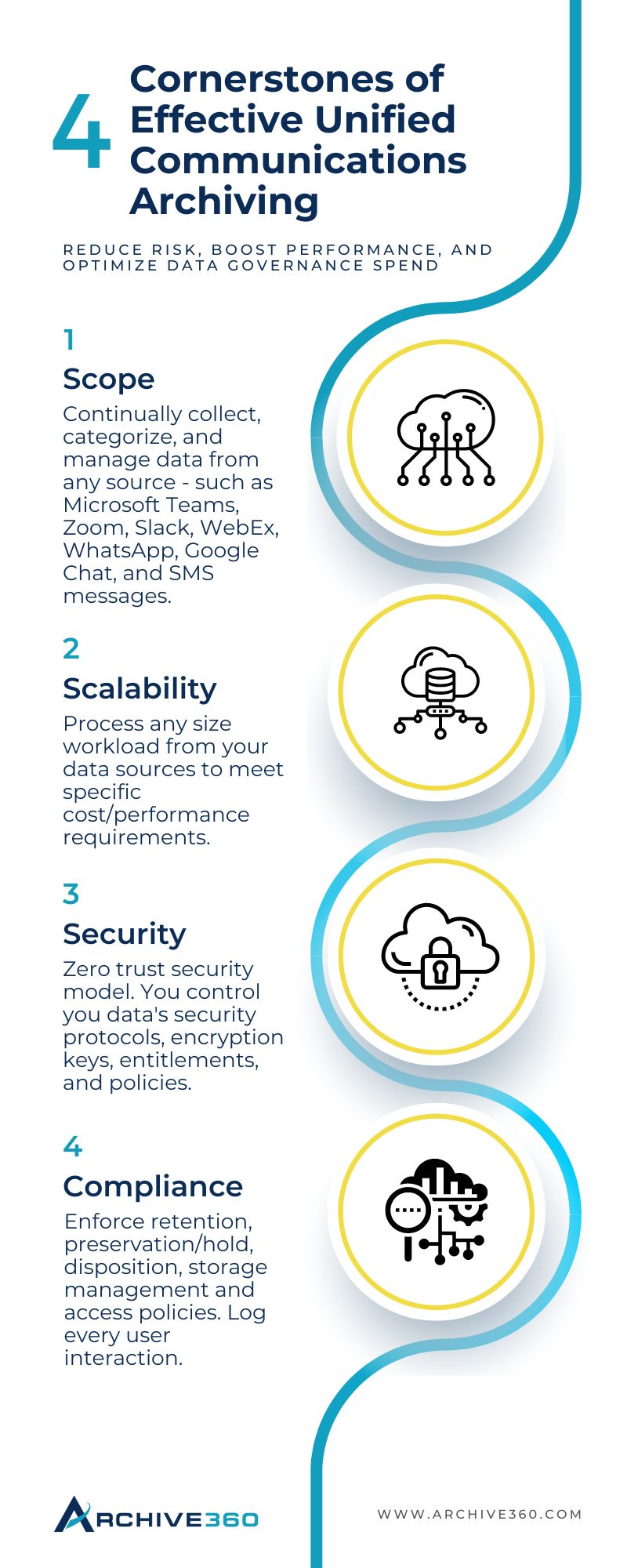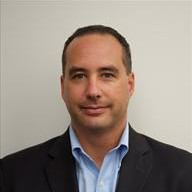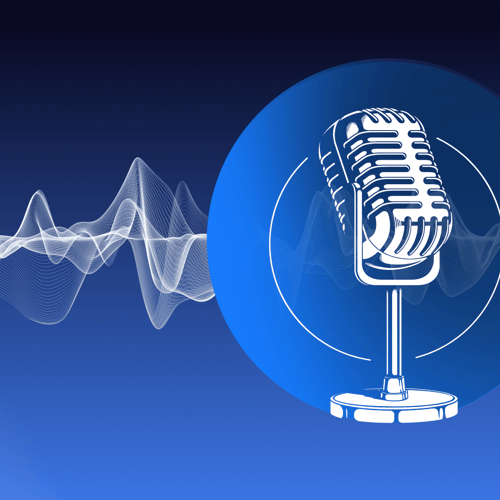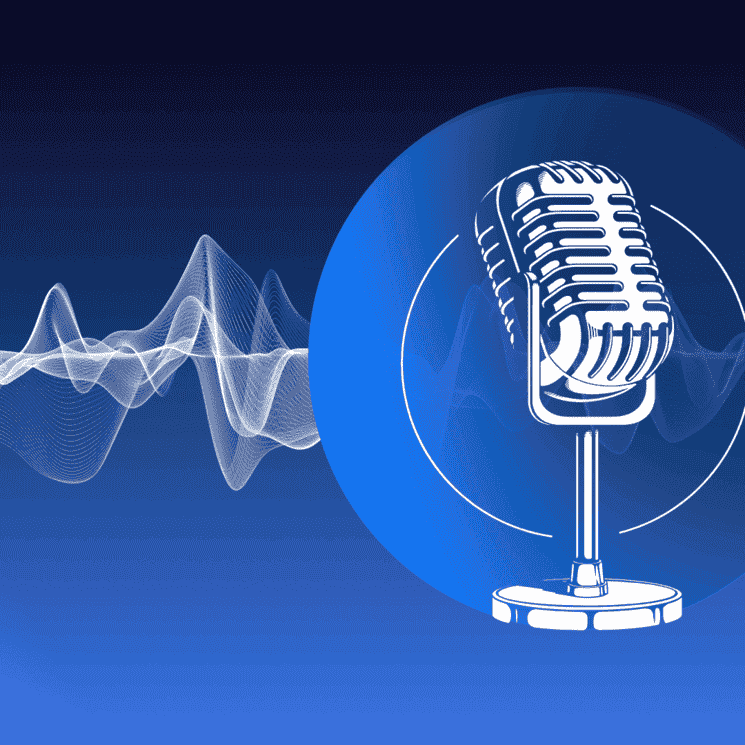Description:
- the different industries that record phone conversations, such as contact centers, emergency services, and stock trading floors, and the reasons behind it, including quality assurance, compliance, and evidence for legal proceedings.
- the evolution of recording technologies, from magnetic tapes to hard disks to cloud-based systems.
- the importance of preserving metadata associated with the recordings and how it can be used for governance, retention, and search purposes.
- the ROI and cost considerations of decommissioning legacy systems and the security risks associated with outdated recording technologies.

WHITEPAPER
Unified Communications Archiving
A guide to reducing risk, boosting performance, and optimizing eDiscovery spend by consolidating communication records from disparate systems into a single repository.
The benefits of Digital Communication Archiving...
- Collect and centrally manage all types of communication records from multiple data sources.
- Unlimited scalability (any data volume, any data source) and control over data processing to
balance cost / performance requirements. - Control who has access, what they have access to, when and where they have access.
Speakers

George Tziahanas
AGC and VP of Compliance
Archive360

Andy Stevens
Founder and CTO
XOVOX
Transcript
George:
Welcome to Archive 360's podcast. Today's podcast is Modernizing Digital Communication Strategies for Migrating and Governing Legacy Audio Channels. Today, we're fortunate to have with us Andy Stevens from XOVOX. Andy, why don't you give a little bit of background in yourself and a little bit about XOVOX.
Andy Stevens:
Sure. Thanks for having me. So my background is I'm a telephone guy going back many years. One of my first jobs was telephone repairman. I eventually got a degree in electrical engineering. My first job out of college was I worked at Bell Labs designing telephone equipment. I later went on to some other schools. I got a PhD in electrical engineering. I worked at IBM, at a few other places. I eventually started a company mostly dedicated to solving weird and esoteric problems. That was my specialty. People who had some kind of problem where they had gone to other companies, consulting houses, to find a solution relating to electronics or engineering or software, and they would bring it to me and we would find a way. And I started a company, it was called Electrical Science, and it was focused on that.
And what happened is a certain type of job kept coming in again and again, and it was related to recorded telephone conversations. And what would happen is, well, first, there are many businesses and agencies that record all the telephone traffic, and we can get to that in a minute. But what I found is there were always people trying to get the recordings out of some kind of computer or recording system, and they were having a lot of trouble and they'd bring it to Electrical Science and we'd figure out a way to do it, to the extent that now 20 years later, it's 99% of our business. And we recently changed our name to XOVOX, which implies exporting out of VOX systems or voice recording systems, and here we are today.
George:
Great. And you brought up the first point that I wanted to get to, which is that people in regulated industries, I think, get it, but a lot of times I think people outside of the regulated industries don't always appreciate just how much recorded conversation there has been historically. Maybe just talk a little bit through some of those different drivers.
Andy Stevens:
Sure. The obvious one, and we've all been through this, you call up some company and they say, "You may be recorded for quality assurance purposes." And so a lot of companies with telephone contact centers, they record. But then there are other industries that record, for example, if you dial 911, it always gets recorded in case maybe it's a shooting and there's a murder trial later, it might be used as evidence in the trial. So they always record. And then there are other businesses that are required by law to record, that's called compliance. A good example is a stock trading floor where if you buy a stock on the phone, a question might come up, "Well, did he order a million shares or a billion shares?" They always have the ability to go back to the recording, listen to it, and figure out what was really said.
Or there's other cases, insurance, they often record and they save it. So for example, a life insurance policy might have a lifetime of 40 or 50 years, and some of the life insurance companies, if you call them for service on your policy, you'll get recorded and they will keep that for the lifetime of the policy, meaning 40 or 50 years. There's a lot of different reasons why people record, but there's a lot of it out there. There's lots of recording.
George:
What's really interesting too is when we work with customers or agencies really across the globe, what we see is there's multiple generations of various audio and recorded conversations. The technologies span these multiple generations and often are deployed concurrently. Maybe talk a little bit about that.
Andy Stevens:
Sure. So when we got started doing this recording extraction, everything was on magnetic tape. And I don't mean cassette tape like you used to have in your car. I'm talking about computer tape. What these recorders would do is first they would take the analog audio and they would digitize it, and then they would compress it very heavily so they could store a lot of hours on a single tape. So you'd buy a recorder and it would say DDS-2 tape will hold thousand hours of recorded audio. These companies would create over time hundreds or even thousands of these magnetic tapes. And then what would happen is that recorder, they'd stop using it, they'd throw it away basically, and now they're stuck with all these tapes with no way to play them back. Plus they're recorded in some kind of proprietary format, which was specific to the tape recording company.
And so again, this used to happen all the time. We'd get handed a shoebox of tapes and we'd get asked, "Can you play these?" And we'd figure out a way. Then tapes are largely out of style these days. What happened is the hard disk became so cheap that people started just storing all the audio on hard disk and individual files, but in some mysterious proprietary format which nobody else could play back. And we'd figure out how to play those. And now fast-forward to today, where the whole focus is moving all of your data to the cloud. That's the focus of IT in general today, including recorded audio. And so some people have a recorder that just records directly to the cloud. In other cases, the entire recording system is in the cloud, just like telephone systems have all migrated to cloud, you don't have a box in your office anymore, which is the PBX. It's just ethernet to the PBX in the cloud. And that's kind of where things are today.
George:
And that transition's been really interesting, right? Because you think about historically you'd have, whether it's a trading floor, you'd have a large contact center, literally people plugged in on a phone in one place and the recorder and the recordings often lived essentially right next door to wherever that place was. And the acceleration to the cloud adoption in this space in part was driven by what the pandemic and also now just the nature of a much more virtual workforce.
Andy Stevens:
Absolutely. So what we saw in the pandemic is these old style contact centers, for example, or even trading floors, suddenly everyone was working from home. In the old style, you'd have this bullpen at your company with maybe a hundred agents all talking on physical phones or headsets and all the recording equipment that was in a machine room right next to it. And where it is today is now all those agents in the call center, most of them work from home now and they have a headset at home. It talks to the contact center system out in the cloud and everything gets recorded in the cloud. I would say things were headed that way already, but COVID really accelerated that because everybody was working at home.
George:
Excellent. Well, so now obviously then we have to go back and think about all of this data that's out there, all this legacy audio channel content, and it often has retention requirements around it. It has this need to be searched and retrieved for the different purposes, whether it's compliance or legal or quality assurance, whatever it might be. But again, to your point, much of this data lived in these proprietary forms. It's very difficult to actually both retain them and then play them back three or five years from now if we decommission that legacy system. So talk about taking that data, converting it, what are clients trying to do to normalize this?
Andy Stevens:
Right. Here's what we see a lot. Here's one approach, is a customer has some existing recording system and there's a whole variety of them. There's companies, NICE, Verint, Genesis, Red Box, they're all these on-premise systems, and then they decide to move to a new cloud-based recording system. And so what they'll do is they'll take all these variety files that are on-premise, some of which replay, some of them don't, most of them don't. And what we'll do for them is we'll convert them all to some open format, either WAV or MP3 is typically what we convert into. So now you don't need that original equipment to replay the audio anymore. It's just a file, a WAV file, an MP3 file.
And then say there's 10 million of those files, we'll move it into the cloud either to an S3 bucket or into an Azure Blob container. And suddenly we call it freeing your data, meaning you're no longer tied to this old system, you don't have to pay the support on it anymore. You have all the individual files and the corresponding metadata for all the files, meaning the timestamps, the agent names, the caller names and so on. And we move it all into the cloud. And then once it's in the cloud, the sky's the limit and you can make it playable to your users. It's all easily accessible and it's not locked up into any system.
George:
Right. Or obviously move it into a platform like ours where then you also get all of the governance that goes around it and the retention disposition, and the search and all of that.
Andy Stevens:
Exactly. Meaning a lot of this stuff, there's some strict retention rule, like seven years and you have to keep it for seven years, and then after seven years and one day you're required to delete it, and that's the extra value that Archive360, things like that, that you bring to it.
George:
So the other interesting part of this is, well, first, by the way, as part of the migration, you can also still retain the old format to the extent that there's a need to do so, but do the conversion as well so that you have the easy playback, but if somebody ever did want to go back to that truly original object, they could do so as well.
Andy Stevens:
That's right. Sometimes we'll save the original copy and the converted copy, and it all comes down to if there's ever some kind of legal proceeding where you need to prove that the audio is accurate, you can kind of have this chain of custody where you have the original file that was stored by the recorder and then our extraction of it, and then if we need to explain how we converted it, we can, and there's this complete record of how we got there.
George:
And then talk a little bit, you mentioned it briefly, the metadata that's associated with the call. The recording systems often would have tremendous amounts of data about that call.
Andy Stevens:
Yes. The modern recording systems, they mostly, and not everyone, but most of them are like this, there's essentially this big pile of audio recordings. It might be a million, ten million, a hundred million, and then for every single recording, you have its corresponding metadata. What time did the call start? How many seconds did it last? Who did they talk to? What number did they dial? What number are they coming from? All this metadata ultimately gets stored in a database and then tied to the individual recordings. So whenever we do one of these jobs, step A is convert all the audio so it's in an open format. And step two is process the database so that we have all the metadata for each recording.
And a lot of these recording systems are different. There's some very simple ones. All you get is start time and stop time, maybe an agent name or a channel number, something like that. So maybe there's seven or eight fields that you get, to some of these systems every recording will have 200 fields where, because in a contact center, they might evaluate all the agents and make a record of how good a job they did on the recording. They might do voice to text where they store a transcription of it. Whatever's in the database we would deliver with the audio file in some kind of format so that it all carries along. Again, you're not dependent on that database, we just extract from it and deliver it with each audio file.
George:
And then doing that then obviously allows a platform like ours to be able to take that metadata, as an example, when the call was created and you use that as the driver for retention, or who was, or the jurisdiction, all that information is actually really rich from a governance perspective, and having it out of a proprietary database really provides a lot of downstream value.
Andy Stevens:
That's right. So here's an example is this has happened, and here's how I know, is there's some kind of insider trading investigation on Wall Street. They'll say, "Give me all this guy's recordings for the year of 2018," and there might be 10,000 recordings, but if we have all the metadata, we just search the metadata for that guy's name and that date interval and we can fetch it all out very easily, whereas it's actually quite hard to do that, frequently, from the original systems.
George:
Well, as we go to wrap this up, I wanted to just maybe one other point here. Think about it from an ROI and cost perspective. I mean, obviously, we kind of see the compliance need for it and all that, but what's the benefit from a business case perspective of getting the stuff out of the legacy systems? Is it really that much cheaper downstream in the new platforms or getting it into a platform like ours versus keeping the legacy system in place?
Andy Stevens:
There's a lot of variables that go into that. So for example, one issue is, and we see this a lot, "All right, my recording system, it's running on Windows 2008 and it's no longer supported by the manufacturer." And so that's an easy decision. They're at risk for losing everything if the disc fails or if the system fails. In that case, it's very cut and dry, they have to get it out.
There are other cases where they've got a huge estate in the old recording system and there's a question, you can either continue to pay support on the old system and keep it for seven years if that's your retention policy versus getting it all out of that system and putting it somewhere else. And so it's usually a straightforward calculation. I mean, this is what support costs per year times seven versus the cost of doing a one-time, a hundred percent extraction out of that old system. Then compare those two numbers and what we usually see is that they're better off taking everything out. But then again, some people prefer to just pay every year and it makes their accounting better and we respect that, but that's part of the equation.
George:
Yeah, although what's interesting is what we see in the drivers for decommissioning platforms outside of audio channels as well often is the security piece. You kind of hit on it, which is you can't upgrade, you can't patch, you can't maintain these effectively over time, and so the risk actually starts to really outweigh the potential benefit anyways.
Andy Stevens:
Absolutely, yes. So there's all these new security directives, like everything shall be encrypted at rest, and if you're using an old recorder from 10 years ago or more, often it just won't do that. So again, that's one of these cases where you really have no choice. If that's the requirement, then yes, you got to get it all out.
George:
Well, great. Andy, it's been awesome having you on the podcast this week. We appreciate your time. If people want to reach you, what's the best way to do so?
Andy Stevens:
Best way would be to look at our website, xovox.tech, or you could reach out to me, stevens@xovox.tech or find us on Google. We're pretty easy to find.
George:
Okay, great. For anybody trying to reach me, it's just georget@archive360.com. This will also be posted on archive360.com/podcast as you'll see the link come up. And with that, I'm going to wrap up. Thanks, everybody, for listening in.
Andy Stevens:
Thanks for having me, George.
Questions?
Have a question for one of our speakers? Post it here.




